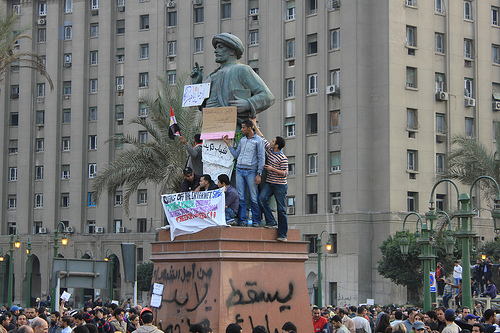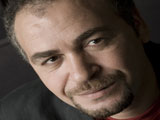The Arabs’ Revolutions and The Intellectuals’ Address
by Hamdy El-Gazzar / September 10, 2012 / No comments
Can altering the president’s speeches change Egyptian politics?

A statue of Omar Makram in Tahrir Square, February 1, 2011. Photo: Jano Charbel. Creative Commons.
A statue of Omar Makram stands in the center of Tahrir Square. His erect posture and superior presence attracts the attention of a regular demonstrator in the square, Professor Ali Mabrouk. Mabrouk is a renowned professor of Islamic Philosophy, and his grasp of Egypt’s history, both politically and intellectually, was complete until this recent period of revolution, when everything was altered.

- “From Egypt” attempts to draw a cultural map of Egypt and the Arab world by profiling the artistic, literary, and political issues that affect the region via on-the-ground coverage of current events, publications, and the fight for freedom of expression.

- Hamdy El-Gazzar is an Egyptian writer and one of the 39 young Arab writers included in the Beirut 39 Project. His first novel, Sihr Aswad (Dar Merit, 2005) won the prestigious Sawaris Award, and was subsequently translated by Humphrey Davies (Black Magic, AUC Press, 2007). His second novel, Ladhdhat Sirriyya (Secret Pleasures) was published by Dar al-Dar in 2008. He is currently working on a third novel.
Back in the year 1805 Omar Makram stood among a group of Egypt’s finest intellectuals and thinkers addressing Muhammad Ali. They said, “We do not want Khorshid the Pasha as our ruler. He must be asked to step down. We will not accept anyone but you as our leader. A leader that governs with our terms—the people’s terms.”
Two centuries passed after that call for a “leader who governs with the people’s rules,” and the public’s call had yet to be answered. Then on January 25, 2011 Omar Makram, the statue, and Ali Mabrouk, the professor, witnessed the largest Egyptian revolution in history.
In Mabrouk’s opinion, the nation that Egyptians have been calling for for over 200 years is a “nation of truth”: A nation of law and justice and the rule of the people, whereas Egypt’s leaders have always wanted it to be a nation of “power,” ruled with military assistance or by using religion to portray the ruler as a holy figure.
Sultan Muhammad Ali, who was elected by the public, turned against his people and claimed that he received the legitimacy of his ruling from God, not the public. He is documented to have said to Refaa el Tahtawy, his trusted advisor and overseer of the nation, “The state of the Pasha is from God and not from the people.”
How will the nation of “truth” in the Arab world be formed in the aftermath of the current revolutions and how will the people overcome the nation of “power” to move forward?
Ali Mabrouk’s response relies on replacing the nation of “Power” with the nation of “Truth.” His initial step is to revise the way in which the public has been addressed for the past 200 years and to adopt an address that supports the creation of a modern nation, a nation built on the ideas of democracy, the people’s right to rule, and a critical and intellectual dialogue. The prevailing method of addressing the public is based on the empowerment of the leader and dictatorship. It is a patriarchal address that exposes the public to a dynamic of suppression and overrule. The modern address needs to be one of “the critical mind,” one that endorses an interactive, dynamic, and open dialogue.
This address alone will lead the change from a nation of tyranny, divided by religious and political sects and a patriarchal regime, to one of “secular, equal citizenship.”
Ali Mabrouk’s book The Arabs’ Revolution, and Inaugurative Address, was released by Dar el Ein Press, 2012.
For more information:
Articles from El Haram by Ali Mabrouk.
Or visit the Facebook group.
Translation: Nour Abdelghani




